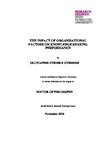The Impact Of Organisational Factors On Knowledge Sharing Performance
| dc.contributor.supervisor | Liu, Shaofeng | |
| dc.contributor.author | Oyemomi, Oluwafemi Oyedele | |
| dc.contributor.other | Faculty of Arts, Humanities and Business | en_US |
| dc.date.accessioned | 2017-08-17T11:59:31Z | |
| dc.date.issued | 2017 | |
| dc.identifier | 10461424 | en_US |
| dc.identifier.uri | http://hdl.handle.net/10026.1/9844 | |
| dc.description.abstract |
Facing global challenges in the knowledge economy, the competitiveness of business organisations has transformed dramatically in recent years. With the increase in the significance of knowledge sharing to organisational growth, a lot of resources have been invested to the management of knowledge via technological applications. In the same line of argument, a wide range of literature has argued for the contribution of employees in the sharing of knowledge. However, there are few literature that discussed the impact of organisational factors on the integration of business processes and knowledge sharing. Given the amount of research on the importance of knowledge management to improve business processes and organisational knowledge, it becomes imperative to develop a clear understanding of the impact of organisational factors on knowledge sharing performance. Therefore, the primary aim of this research is develop and validate a functional knowledge sharing model which can facilitate and enhance organisational performance considering the impact of organisational factors for business-knowledge implementation. A conceptual framework is built based on thorough literature review of knowledge management, organisational factors, performance and in-depth discussion with knowledge experts. The proposed conceptual framework is empirically tested adopting a quantitative method with survey data using over 300 responses from manufacturing and service industries in seven countries across three continents for a comprehensive and balanced view. The data from the survey are analysed by using integrated techniques of both Fuzzy Set Qualitative Comparative Analysis (fsQCA) and Data Envelopment Analysis (DEA). The fsQCA phase of this study discussed the comparative impact of organisational factors in the seven countries where survey data were collected and formulated the input and output variables for the measurement of knowledge sharing performance using DEA. With regard to the findings of the empirical research, three main constructs (knowledge sharing, organisational factors and performance) were successfully validated as dimensional constructs. The structural paths support conceptual framework that knowledge sharing has a positive influence on organisational competitive advantage, and organisational factors such as culture has a strong contribution to knowledge sharing performance. However, the direct impact of knowledge sharing on organisational performance is insignificant when key performance indicators are not identified. Various manufacturing and service organisations will potentially benefit from applying the results of this study to their knowledge sharing practices when seeking greater integration of multi business processes with accrued knowledge. The theoretical contribution of this study includes an integrated framework and model for knowledge transformation processes, knowledge sharing processes and knowledge sharing decision making for organisational performance. | en_US |
| dc.description.sponsorship | Self | en_US |
| dc.language.iso | en | |
| dc.publisher | University of Plymouth | |
| dc.subject | Organisational performance | en_US |
| dc.subject | Knowledge transformation processes | |
| dc.subject | Knowledge sharing processes and organisational factors | |
| dc.subject.classification | PhD | en_US |
| dc.title | The Impact Of Organisational Factors On Knowledge Sharing Performance | en_US |
| dc.type | Thesis | |
| plymouth.version | publishable | en_US |
| dc.identifier.doi | http://dx.doi.org/10.24382/1013 | |
| dc.rights.embargodate | 2018-08-17T11:59:31Z | |
| dc.rights.embargoperiod | 12 months | en_US |
| dc.type.qualification | Doctorate | en_US |
| rioxxterms.version | NA |
Files in this item
This item appears in the following Collection(s)
-
01 Research Theses Main Collection
Research Theses Main


